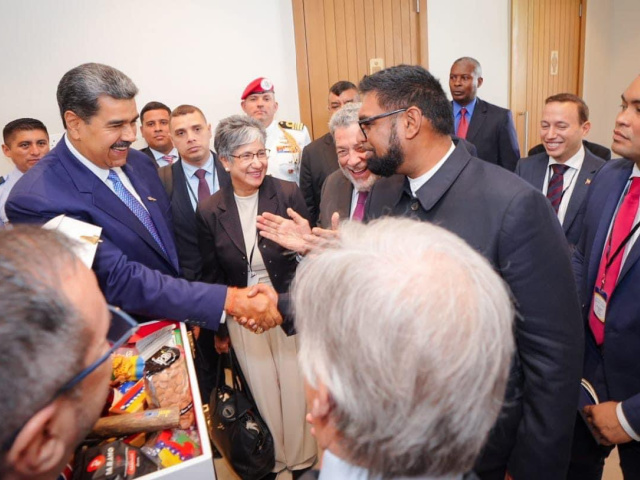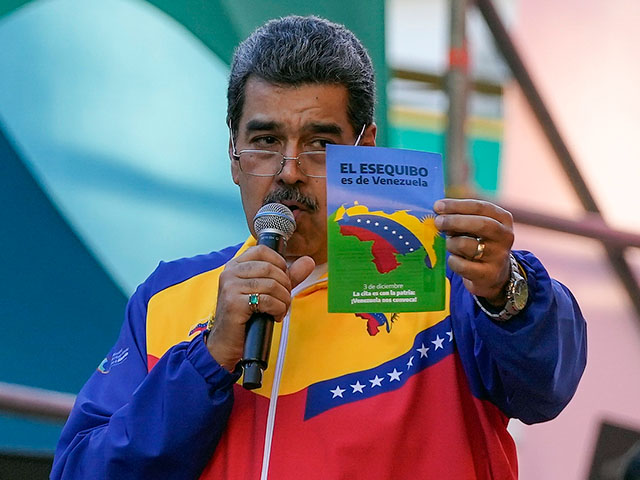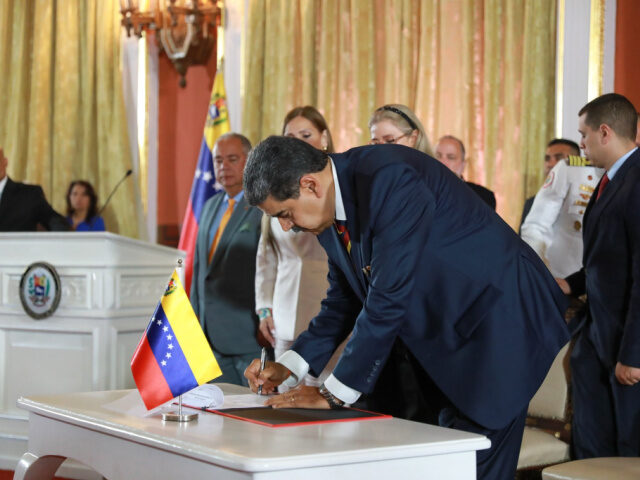The government of Guyana condemned neighboring Venezuela on Wednesday for having passed a law that “creates” a new state out of two-thirds of Guyana’s territory in an effort to annex the historically contested Essequibo region.
The “Organic Law for the Defense of Guayana Esequiba,” approved by the Venezuelan National Assembly on late March and signed by socialist dictator Nicolás Maduro on Wednesday, establishes the purported creation of a new state for Venezuela called “Guayana Esequiba,” which will allegedly occupy the entirety of the Essequibo region, a 61,600-square-mile territory that Guyana currently administers and that represents approximately two-thirds of its entire territory.
Both countries have maintained a territorial dispute over the Essequibo for more than 120 years, which has yet to reach a final conclusive ruling at international organizations.
The Maduro regime claims that the law is a “mandate” stemming from the results of a sham referendum held in December that asked Venezuelans “what to do” about the Essequibo dispute with Guyana. The Maduro regime has repeatedly claimed that “over ten million” votes were cast in favor of its annexation plans despite extensive footage taken on the day of the referendum that showed extremely low voter turnout and, in some cases, completely empty electoral centers.
The creation of a purported new state in the Essequibo region is part of the socialist regime’s broader list of actions to annex and “administer” the contested territory and its resources.
Guyana, through its Foreign Ministry, issued a statement on Wednesday expressing its concerns over the Maduro regime’s new law and declaring the socialist regime’s attempts to annex the Essequibo as an “egregious violation of the most fundamental principles of international law.”
The statement reads:
In this light, the Government of the Cooperative Republic of Guyana wishes to put on notice the Government of the Bolivarian Republic of Venezuela, the Governments of the Caribbean Community and the Latin American and Caribbean Community of Nations, as well as the Secretary General of the United Nations and the Secretary General of the Organization of American States, that it will not countenance the annexation, seizure or occupation of any part of its sovereign territory.
Guyana has always stood by the principles of the United Nations Charter, the rule of law and the peaceful settlement of disputes.
The Guyanese Foreign Ministry continued its statement by denouncing the Maduro regime’s annexation attempts as a violation of an agreement signed between dictator Maduro and President Irfaan Ali in December in St. Vincent and the Grenadines, in which both parties had agreed to “not utilize force” and avoid any escalation of the conflict regarding the territorial dispute.

President Irfaan Ali and Venezuela’s Nicolas Maduro exchanged gifts in St Vincent. The exchange was done in the presence of U.N. Secretary General, Antonio Gutteres, and St Vincent and the Grenadines’s Prime Minister, Dr Ralph Gonsalves (Twitter/Office of the President Photo).
Venezuela has claimed the Essequibo territory is part of its borders ever since it gained independence from Spain in 1811. In 1899, an arbitration process held in Paris established the current borders of both countries, granting control of the Essequibo region to Guyana. Venezuela has long argued that the 1899 ruling was fraudulent.

Venezuela’s President Nicolas Maduro gives a speech during the closing campaign on Venezuela Referendum on dispute territory with Guyana in Caracas, Venezuela, Friday, Dec. 1, 2023 (AP Photo/Matias Delacroix).
Venezuela’s denouncement of the 1899 Paris agreement at the United Nations led to a new agreement signed by both countries in Geneva in 1966, a time when Guyana was months away from gaining its independence from the United Kingdom.
The new 1966 agreement granted control of the contested territory to Guyana until a permanent solution was found. No permanent solution was reached in the following decades, causing the dispute to become relatively dormant until Guyana began to sign offshore oil drill contracts with American oil company ExxonMobil, drawing the ire of Maduro and his rogue socialist regime.
The Maduro regime has responded to Guyana and ExxonMobil’s deals with repeated threats, going as far as to deploy the Venezuelan Navy in December 2018.
The International Court of Justice (ICJ), following a request made by Guyana in 2018, ruled in 2023 that it has jurisdiction over the Essequibo dispute but said a final binding ruling is “years away” from being issued.
“If Venezuela wants to contest title to the territory in question, the proper forum is the International Court of Justice, which will decide the issue objectively and according to the law,” the Guyanese Foreign Ministry statement said.
The Guyanese Foreign Ministry concluded its statement by saying that Maduro’s “offensive and undignified statements” against President Ali have not gone unnoticed. It said the socialist dictator’s words and actions have “seriously threatened” the agreement signed in St. Vincent and the Grenadines.
Maduro has recently accused Ali of allowing the United States to build “secret military bases” in the Essequibo region. Maduro claims that the purported bases are part of an “aggression” and escalation plot against Venezuela.
“We have proven information that in the territory of Guyana Esequiba, temporarily administered by Guyana, they have installed secret military bases of the Southern Command, nuclei of the Southern Command and nuclei of the CIA,” Maduro said.
“President Irfaan [Ali] does not govern Guyana, Guyana is governed by the Southern Command, the CIA and ExxonMobil, and I am not exaggerating, they control the Congress, two parties that form the majority, government and opposition, they totally control the Guyanese defense forces, the police forces,” he continued.
Maduro has not publicly disclosed evidence to substantiate his allegations as of press time.
White House National Security Council spokesman John Kirby denied Maduro’s accusations, stating that “there’s no plans for a secret military base” and urging both countries to abide to the 1899 ruling “and to do it peacefully.”

COMMENTS
Please let us know if you're having issues with commenting.